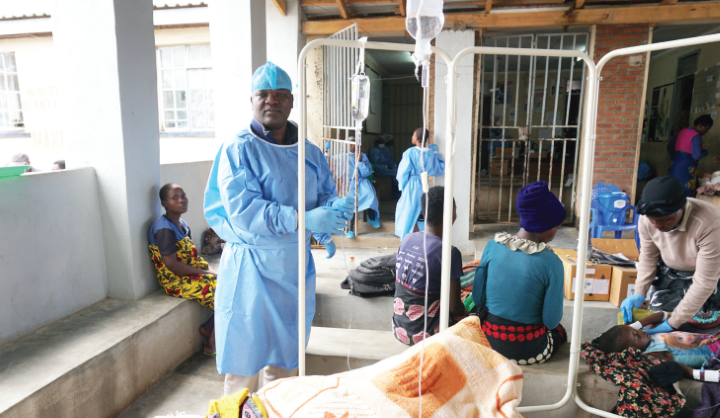Malawi’s female writers lead in maternal health reporting
 A study has exposed gaps in how journalists in Malawi report on maternal and child health issues, with female journalists writing more stories on this topic than males.
A study has exposed gaps in how journalists in Malawi report on maternal and child health issues, with female journalists writing more stories on this topic than males.
The study was conducted between 2009 and 2012 by Panos Institute Southern Africa (PSAf), a regional communication for development organisation that works on various development issues, with funding from the British Department for International Development (DfID).
“The report gives a synthesis of the print and electronic media articles and programmes published and broadcast between April 2009 and February 2012 under the PSAf maternal health media fellowship project in Malawi,†reads the report in part.
PSAf executive director Lillian Chigona said the organisation engaged the local media and trainers in the training of journalists from various media houses on how best they can report on maternal health-related issues.
“Between 2009 and 2012, we trained 39 interested journalists, awarded them media fellowships to produce high quality research-based stories on maternal health, gender, girls’ education and access to justice, especially for women and girls,†she said.
The training, she said, resulted in the production of over 48 print stories, 31 radio programmes, 10 radio interviews and two television documentaries—giving a total of 91 media outputs.
“Female journalists did almost 60 percent of the stories while their male counterparts did the remaining 40 percent,†she noted.
Ironically, according to a 2010 Gender Links report, around 89 percent of journalists in Malawi are male and dominate almost all areas of coverage.
Yet, the Panos project proved otherwise.
“The presence of more female reporters in the PSAf media trainings in April 2009, June and October 2011, respectively, could be an indication that newsrooms tend to associate issues of maternity with women or that gender relations in newsrooms have changed. It reflects how Malawians approach pregnancy, and generally maternal health and gender issues,†says Chigona.
She said such stereotyping leads to Malawian men not understanding and appreciating what their spouses and other pregnant women go through,†she said.
However, she observed that the down-side of this is that men are left out of the sensitisation and their knowledge levels on reproductive health remain lower than that of women, while the deciding power on when and how to have children still remains with the men.
Former director of Media Council of Malawi, Penelope Kakhobwe, now a journalism lecturer at the University of Botswana, concurred with the findings, saying it is high time male journalists reported more on maternal and child health.
She said Malawian men should appreciate what reproductive health involves and how they can effectively play a supportive role for their wives and children.
“Looking at the role and dominance of female journalists in this Panos project, I am tempted to conclude that most of Malawian journalists who report on maternal heath do so out of passion because they are females and feel compassionate and not out of fashion,†said Kakhobwe.
A veteran journalist from Malawi News Agency (Mana), Gospel Mwalwanda, feels male journalists also write on maternal health issues
“As a male journalist, I have written many articles on maternal health so I don’t think it is true that more female than male journalists write on maternal and child health,†said Mwalwanda, who has over 30 years work experience.
One way to encourage more male journalists on this issue is through trainings, as United Nations Population Fund (UNFPA) communications officer Pilirani Semu-Banda says.
“Media reports on maternal health have improved greatly. We are seeing a lot of well-researched and balanced news reports, especially features, which tackle important issues on maternal health,†she says.
She says with training, there has been a notable difference in the kind of stories published or broadcast.
“Media reports from the journalists we have trained are knowledge-informed and comprehensive. We have ended up creating media awards through the National Media Institute of Southern Africa (Namisa) that go towards excellent reporting in maternal health because we are impressed with the high standards that the media is showing in pursuing stories on maternal health,†says Semu-Banda.
Chigona said the media plays a critical role in ensuring good health for women and children, and there is a need to involve male journalists in this endeavour.
“We believe that interventions such as the media fellowships will enhance our efforts to foster equitable access to health by amplifying voices of different stakeholders,†she concluded.
Â





